CHEVROLET MONTE CARLO 1996 5.G Service Manual
Manufacturer: CHEVROLET, Model Year: 1996, Model line: MONTE CARLO, Model: CHEVROLET MONTE CARLO 1996 5.GPages: 340, PDF Size: 17.79 MB
Page 41 of 340
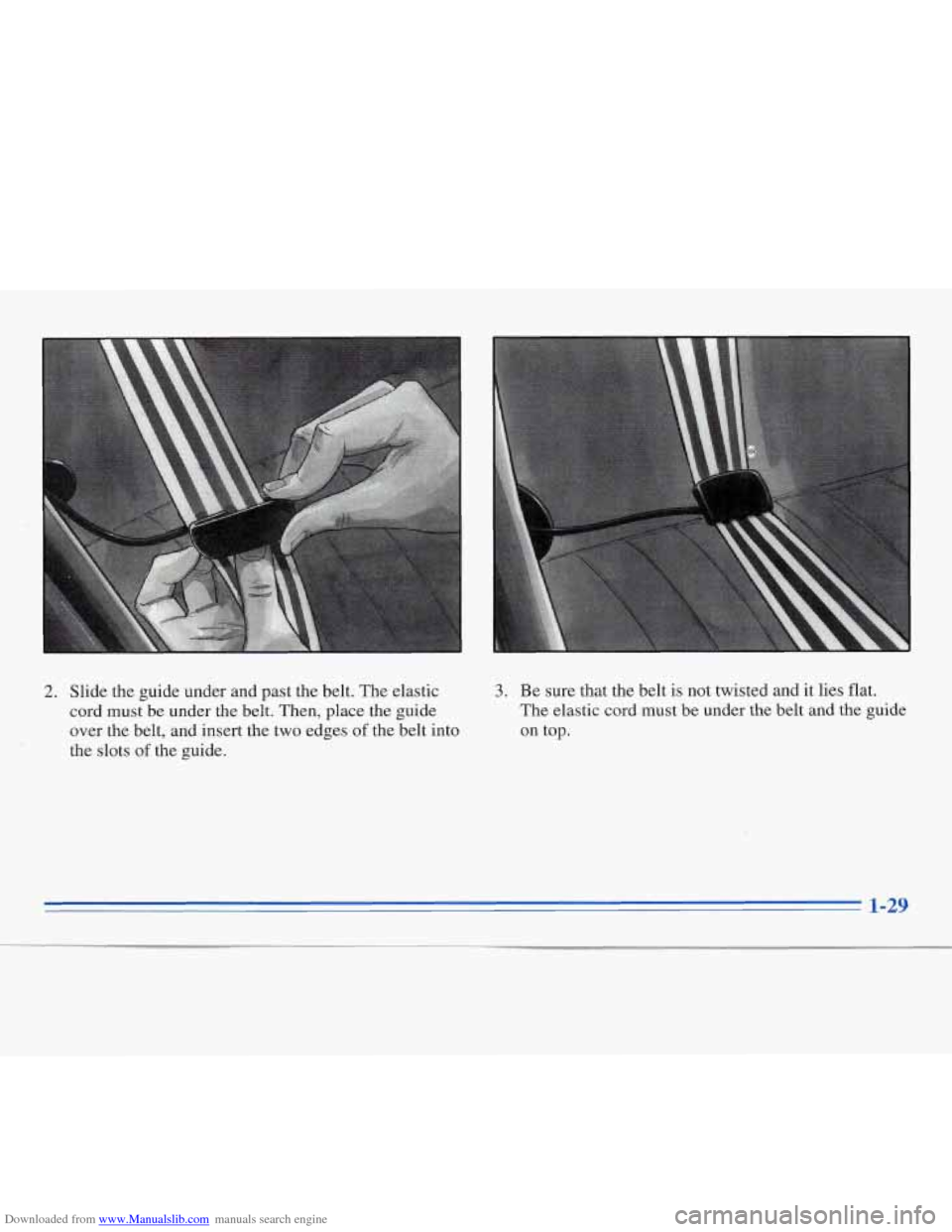
Downloaded from www.Manualslib.com manuals search engine 2. Slide the guide under and past the belt. The elastic
cord must be under the belt. Then, place the guide
over the belt, and insert the two edges of the belt into
the slots
of the guide.
3. Be sure that the belt is not twisted and it lies flat.
The elastic cord must be under the belt and the guide
on top.
1-29
Page 42 of 340
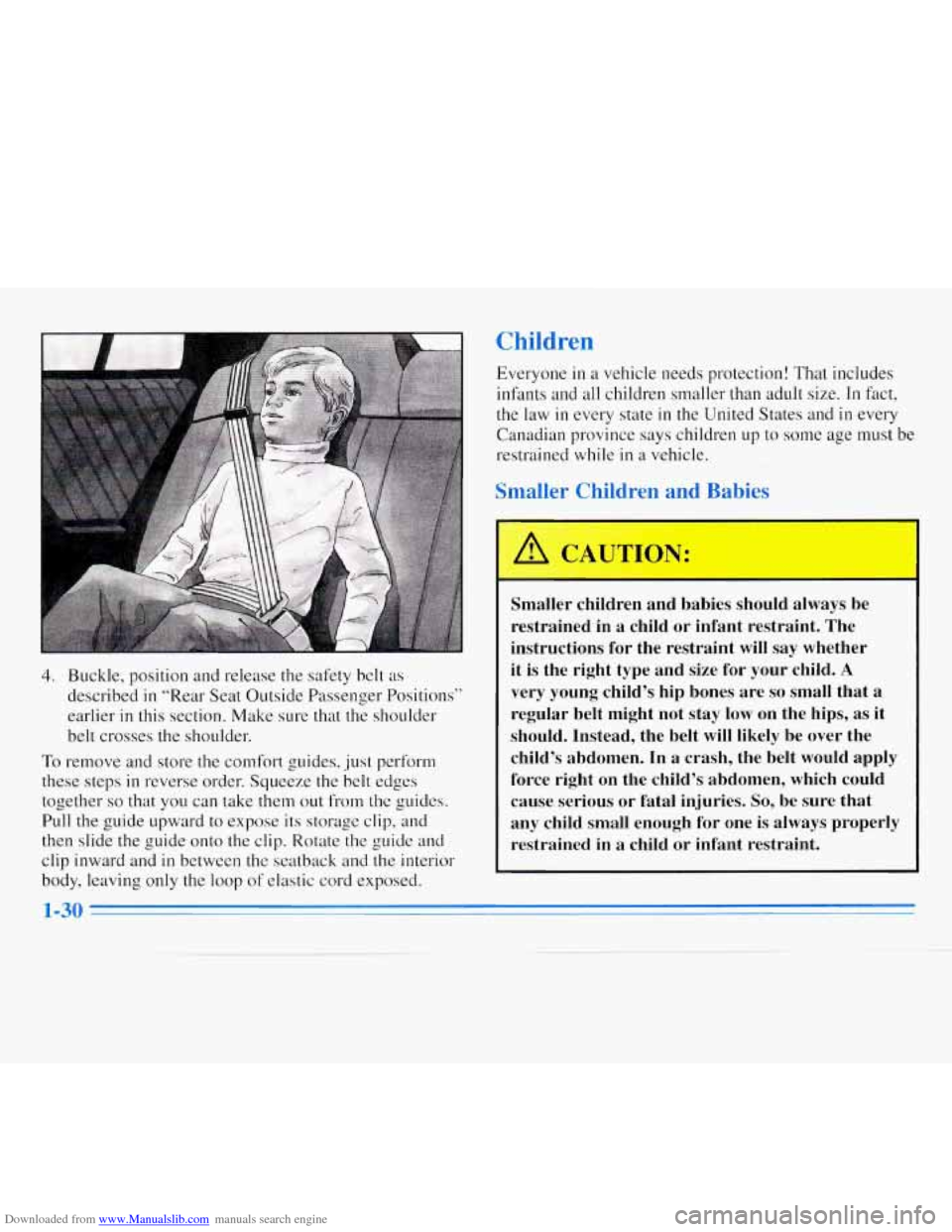
Downloaded from www.Manualslib.com manuals search engine 4. Buckle, position and release the safety belt as
described in “Rear Seat Outside Passenger Positions”
earlier
in this section. Make sure that the shoulder
belt crosses the shoulder.
To remove and store the comfort guides, just perform
these steps in reverse order. Squeeze the belt edges
together
so that you can take them out from the guides.
Pull the guide upward to expose its storage clip, and
then slide the guide onto the clip. Rotate the guide and
clip inward and
in between the seatback and the interior
body, leaving only the loop of elastic cord exposed.
1-30
Everyone 111 a vehicle needs protection! That includes
infants and all children smaller than adult size. In fact,
the law
in every state in the United States and in every
Canadian province says children
up to some age must be
restrained while
in a vehicle.
Smaller children and babies should always be
restrained in a child or infant restraint. The
instructions for the restraint will say whether
it is the right type and size for your child.
A
very young child’s hip bones are so small that a
regular belt might not stay low on the hips, as it
should. Instead, the belt will likely be over the
child’s abdomen. In a crash, the belt would apply
force right on the child’s abdomen, which could
cause serious or fatal injuries.
So, be sure that
any child small enough for one is always properly
restrained in a child or infant restraint.
Page 43 of 340
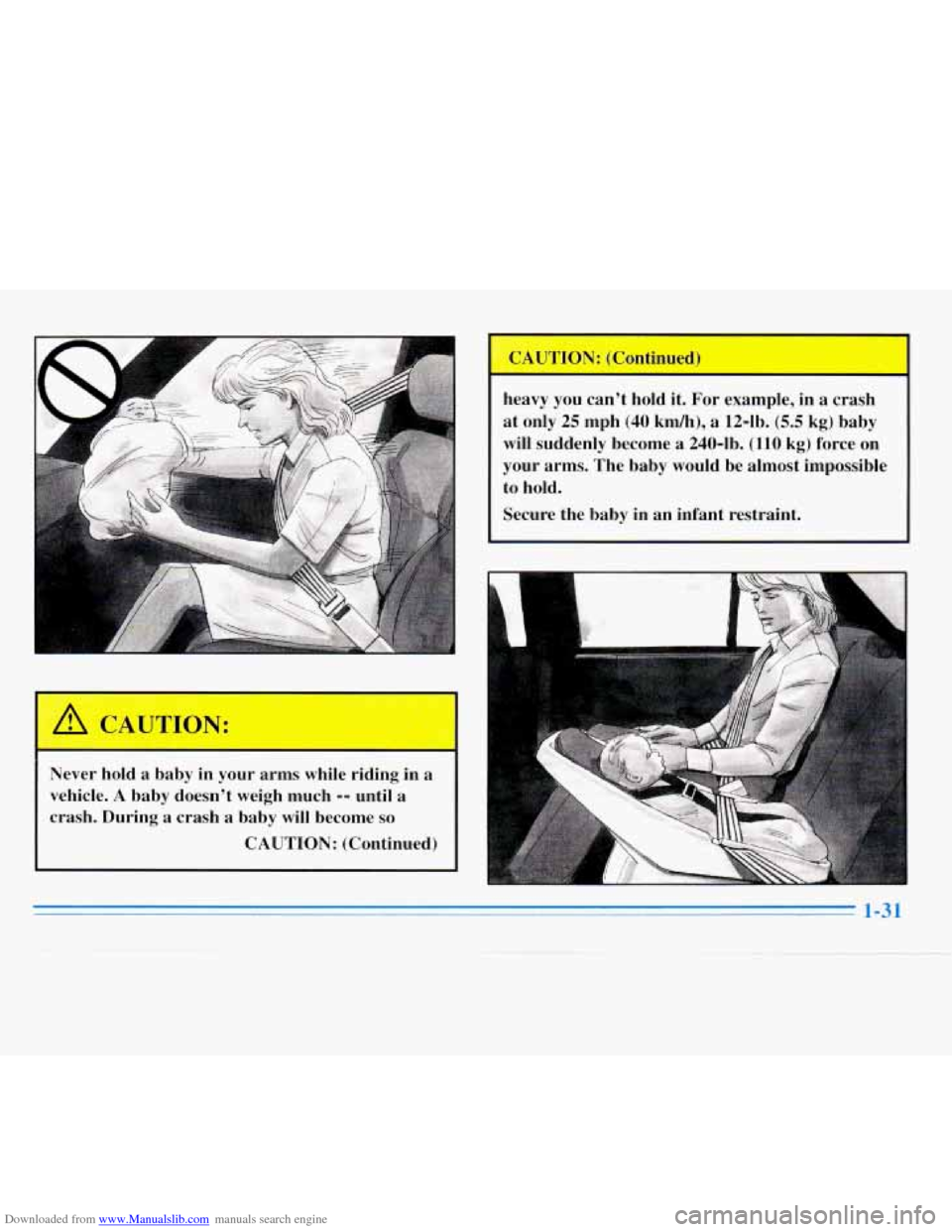
Downloaded from www.Manualslib.com manuals search engine heavy you can’t hold it. For example, in a crash
at only
25 mph (40 km/h), a 12-lb. (5.5 kg) baby
will suddenly become a 240-lb.
(110 kg) force on
your arms. The baby would be almost impossible
to hold.
Secure the baby
in an infant restraint.
Never hold a baby in your arms while riding in a
vehicle.
A baby doesn’t weigh much -- until a
crash. During a crash a baby will become so
CAUTION: (Continued)
Page 44 of 340
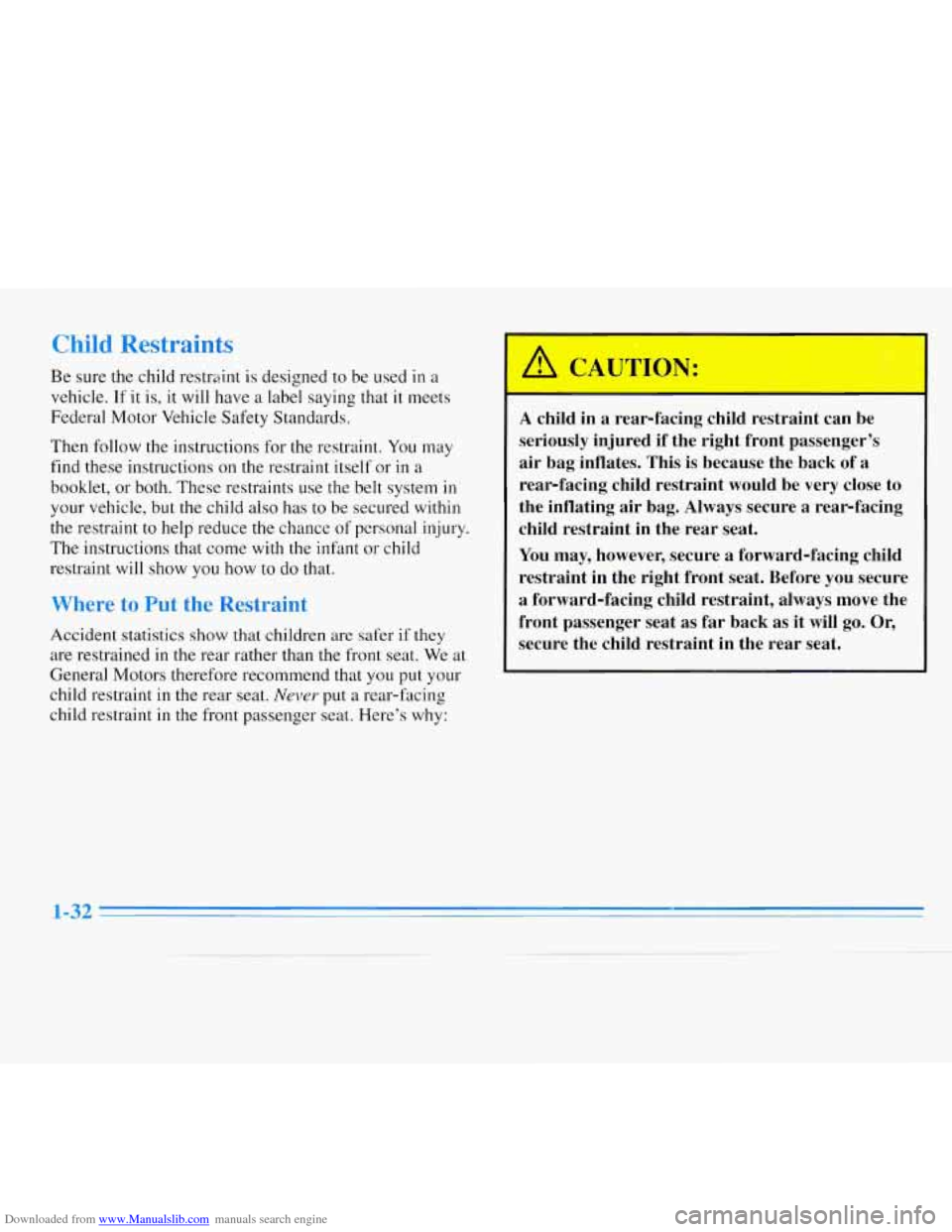
Downloaded from www.Manualslib.com manuals search engine A YL
Be sure the child restraint is designed to be used in a
vehicle.
If it is, it will have a label saying that it meets
Federal Motor Vehicle Safety Standards.
Then follow the instructions for
the restraint. You may
find these instructions on the restraint itself or
in a
booklet, or both. These restraints use the belt system
in
your vehicle, but the child also has to be secured within
the restraint to help reduce the chance of personal injury.
The instructions that come
with the infant or child
restraint will show you how to do that.
Accident statistics show
that children are safer if they
are restrained in
the rear rather than the front seat. We at
General Motors therefore recommend that you put your
child restraint
in the rear seat. Never put a rear-facing
child restraint
in the front passenger seat. Here’s why:
r
A child in a rear-facing child restraint can be
seriously injured if the right front passenger’s
air bag inflates. This is because the back of a
rear-facing child restraint would be very close to
the inflating air bag. Always secure a rear-facing
child restraint
in the rear seat.
You may, however, secure a forward-facing child
restraint in the right front seat. Before you secure
a forward-facing child restraint, always move the
front passenger seat as far back as it will go. Or,
secure the child restraint in the
rear seat.
Page 45 of 340
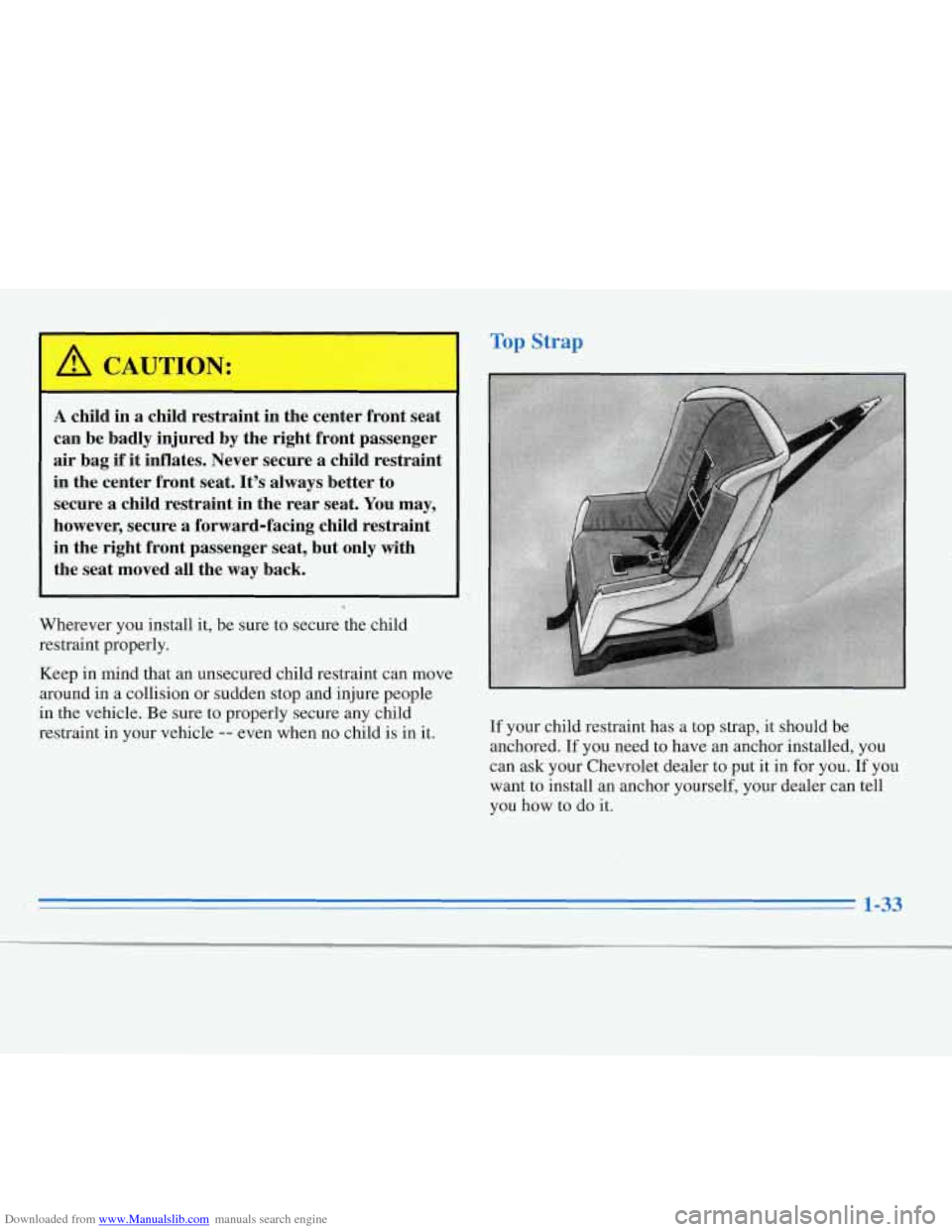
Downloaded from www.Manualslib.com manuals search engine I
A child m a child restraint in the center front seat
can be badly injured by the right front passenger
air bag
if it inflates. Never secure a child restraint
in the center front seat. It’s always better to
secure a child restraint in the rear seat.
You may,
however, secure a forward-facing child restraint
m the right front passenger seat, but only with
the seat moved
all the way back.
Wherever you install it, be sure to secure the child
restraint properly.
Keep in mind that
an unsecured child restraint can move
around in a collision or sudden stop and injure people
in
the vehicle. Be sure to properly secure any child
restraint in your vehicle
-- even when no child is in it. If
your child restraint has a top strap,.it should be
anchored.
If you need to have an anchor installed, you
can ask your Chevrolet dealer to put it in for you.
If you
want to install an anchor yourself, your dealer can tell
you how to
do it.
.l-f
Page 46 of 340
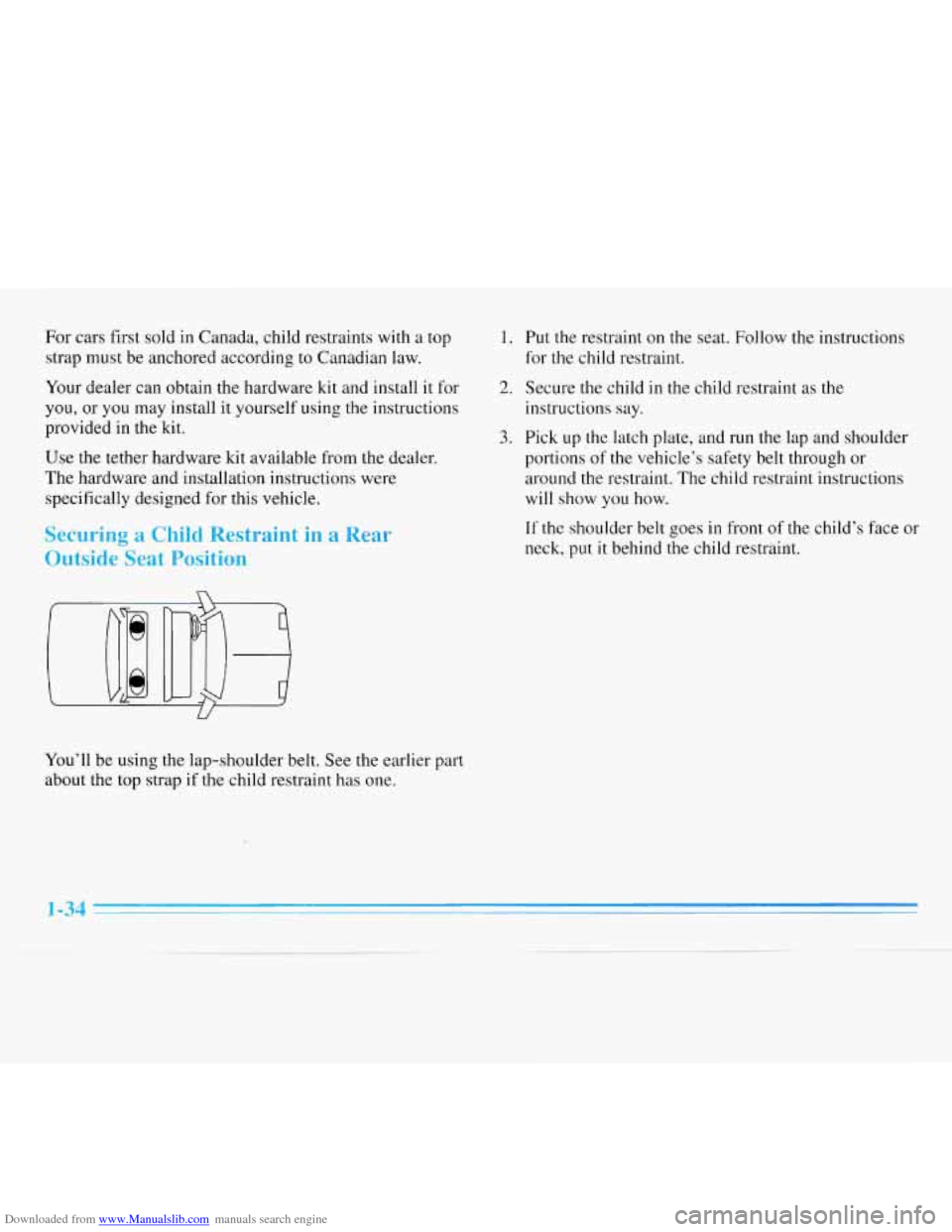
Downloaded from www.Manualslib.com manuals search engine For cars first sold in Canada, child restraints with a top
strap must be anchored according to Canadian law.
Your dealer can obtain the hardware kit and install it for
you, or you may install it yourself using the instructions
provided in the
kt.
Use the tether hardware kit available from the dealer.
The hardware and installation instructions were
specifically designed for this vehicle.
Securing a Child Restraint in a Rear
Outside Seat Position
U
You’ll be using the lap-shoulder belt. See the earlier part
about the top strap if the child restraint has one.
1. Put the restraint on the seat. Follow the instructions
for the child restraint.
2. Secure the child in the child restraint as the
instructions
say.
3. Pick up the latch plate, and run the lap and shoulder
portions of the vehicle’s safety belt through or
around the restraint. The child restraint instructions
will show you how.
If the shoulder belt goes in front of the child’s face or
neck,
put it behind the child restraint.
1-34
Page 47 of 340
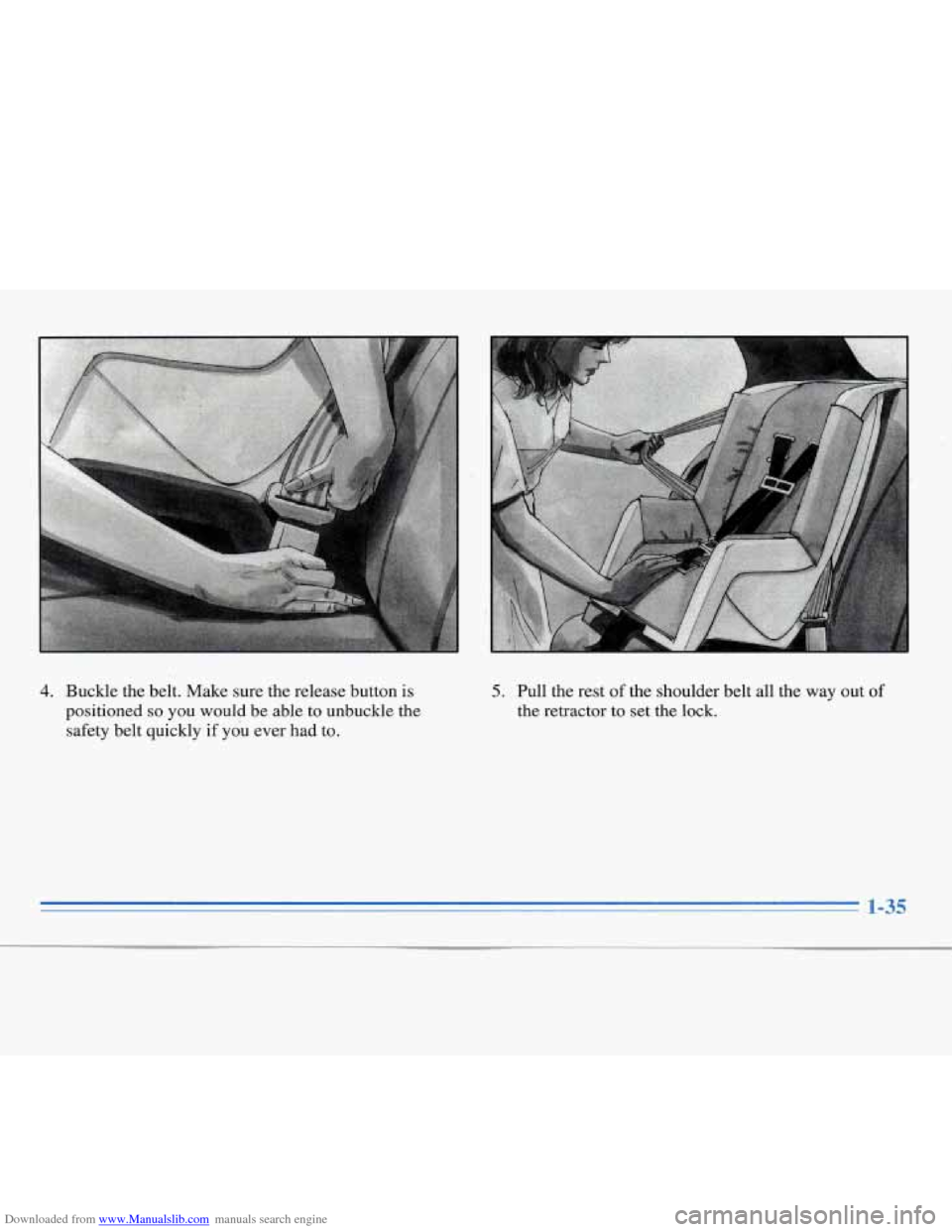
Downloaded from www.Manualslib.com manuals search engine 4. Buckle the belt. Make sure the release button is
positioned
so you would be able to unbuckle the
safety belt quickly if you ever
had to.
5. Pull the rest of the shoulder belt all the way out of
the retractor
to set the lock.
1-35
Page 48 of 340
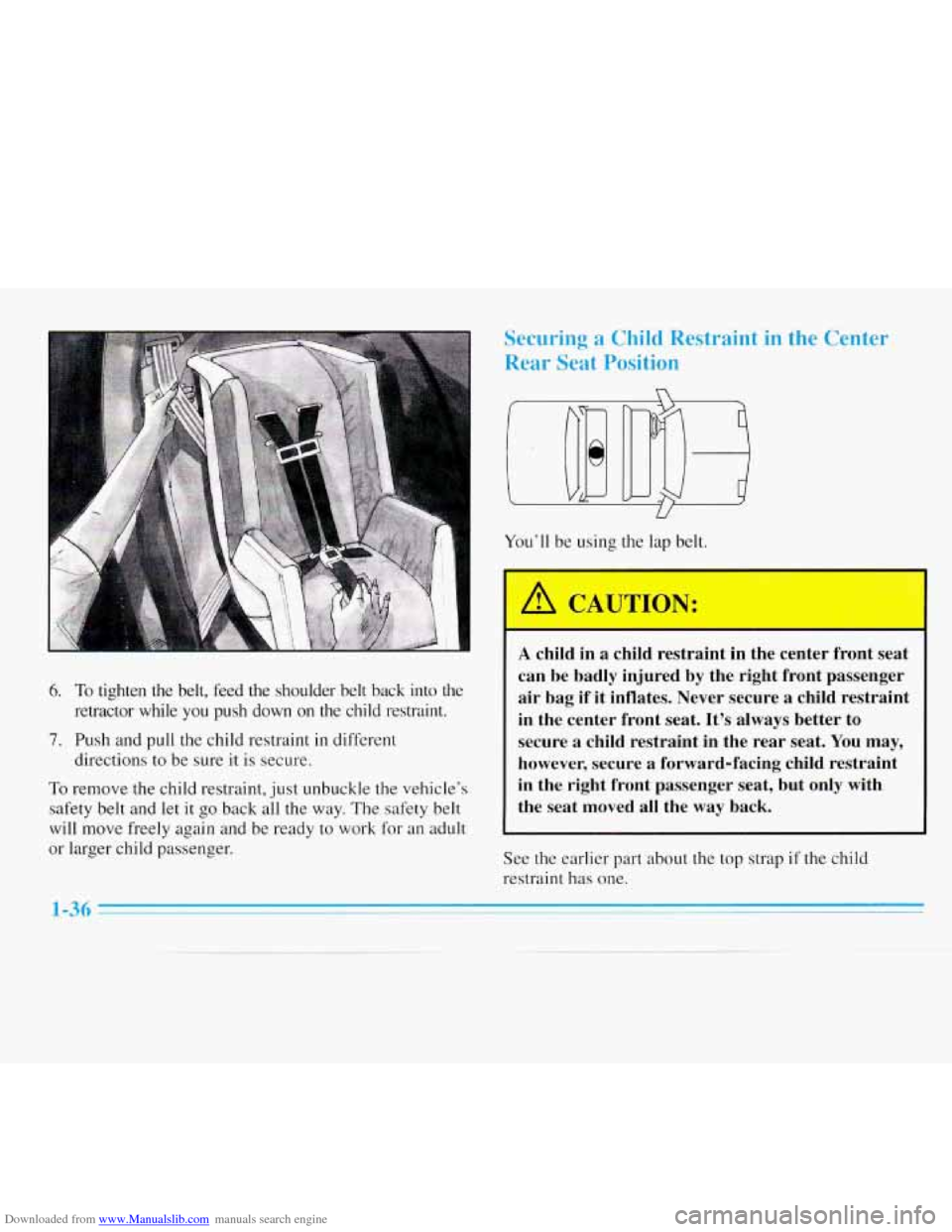
Downloaded from www.Manualslib.com manuals search engine 6. To tighten the belt, feed the shoulder belt back into the
retractor while you push down on the child restraint.
7. Push and pull the child restraint in different
directions to
be sure it is secure.
To remove the child restraint, just unbuckle the vehicle’s
safety belt and let it
go back all the way. The safety belt
will move freely again and
be ready to work for an adult
or larger child passenger.
1-36
Securing a Child Restraint in the Center
Rear Seat Position
n
You’ll be using the lap belt.
A child in a child restraint in the center front seat
can be badly injured by the right front passenger
air bag
if it inflates. Never secure a child restraint
in the center front seat. It’s always better to
secure a child restraint in the rear seat. You
may,
however, secure a forward-facing child restraint
in the right front passenger seat, but only with
the seat moved all the way back.
See the earlier part about the top strap if the child
restraint has one.
Page 49 of 340
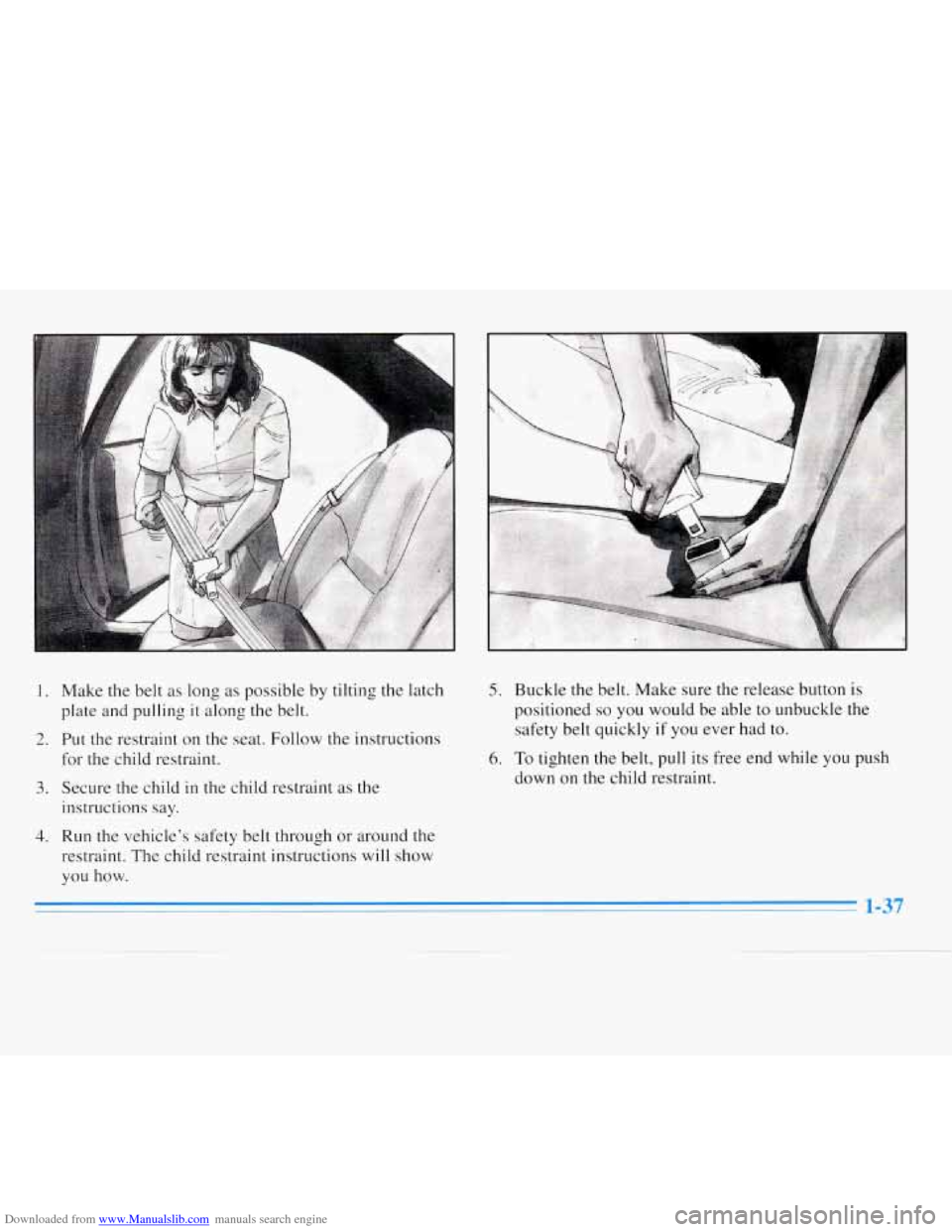
Downloaded from www.Manualslib.com manuals search engine 1.
2.
3.
4.
Make the belt as long as possible by tilting the latch
plate and pulling
it along the belt.
Put the restraint on the seat. Follow the instructions
for the child restraint.
Secure
the child in the child restraint as the
instructions say.
Run the vehicle's safety belt through or around the
restraint. The child restraint instructions
will show
you how.
5. Buckle the belt. Make sure the release button is
positioned so you would be able to unbuckle the
safety belt quickly if you ever had to.
6. To tighten the belt, pull its free end while you push
down on the child restraint.
1-37
Page 50 of 340
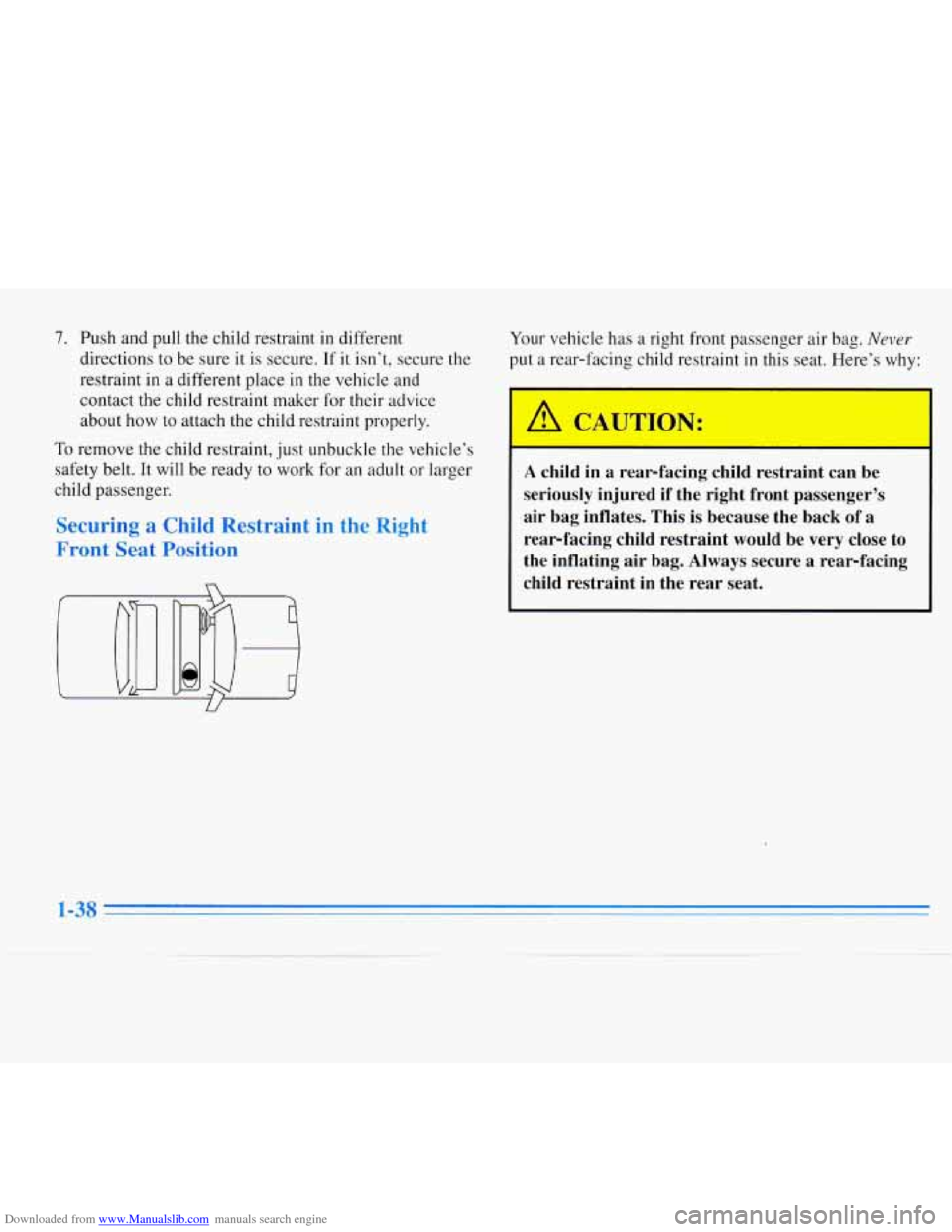
Downloaded from www.Manualslib.com manuals search engine 7. Push and pull the child restraint in different
directions to be sure it is secure. If
it isn’t, secure the
restraint in
a different place in the vehicle and
contact
the child restraint maker for their advice
about how
to attach the child restraint properly.
To remove the child restraint, just unbuckle the vehicle’s
safety belt.
It will be ready to work for an adult or larger
child passenger.
Securing a Child Restraint in the Right
Front Seat Position
U
Your vehicle has a right front passenger air bag. Never
put a rear-facing child restraint in this seat. Here’s why:
v1 AUTION:
A child in a rear-facing child restraint can be
seriously injured if the right front passenger’s
air bag inflates. This is because the back of a
rear-facing child restraint would be very close to
the inflating air bag. Always secure a rear-facing
child restraint in the rear seat.
1-38